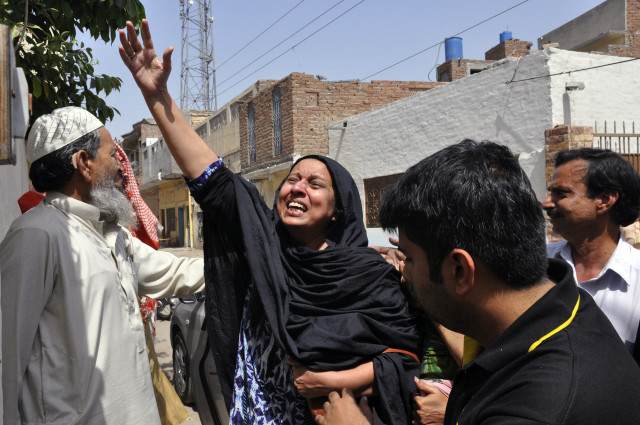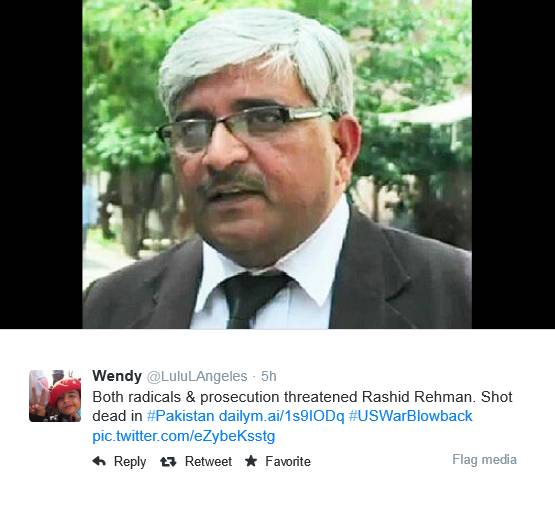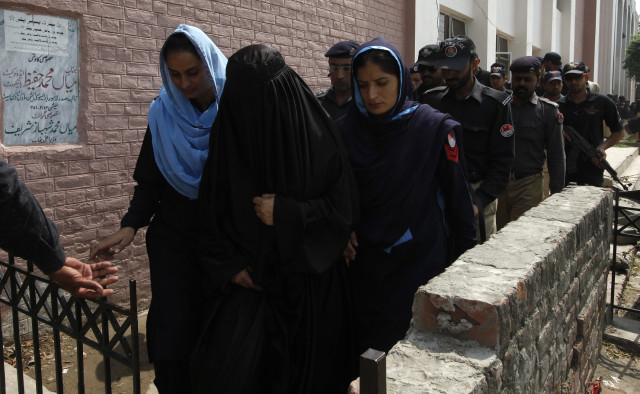
A woman reacts to the killing of Rashid Rehman, a lawyer who was shot by unidentified gunmen a day earlier, outside his residence in Multan May 8, 2014. Gunmen posing as clients shot dead the prominent human rights lawyer defending a professor accused of blasphemy, officials said Thursday, underscoring the danger facing those trying to put an end to religious intolerance in majority-Muslim Pakistan. Wednesday’s killing of Rashid Rehman in the southern city Multan was the first time a lawyer has been killed for taking on a blasphemy case, police said. REUTERS/Stringer
Lawyers and human rights activists in Pakistan are mourning the murder of a prominent human rights lawyer who was gunned down in his office May 8th by unknown assailants.
Rashid Rehman, 53, was the lawyer representing Junaid Hafeez, the Bahauddin Zakariya University lecturer is accused of spreading blasphemy — it is unclear whether he actually wrote a comment or merely ‘liked’ it; his Facebook page has since been removed.
His accusers were hardline university students themselves.

Rehman served as the regional coordinator for the independent Human Rights Commission of Pakistan (HRCP), which says it has lost six of its members. Five of them — Naeem Sabir (2011), Siddique Eido (2011), Zarteef Afridi (2011), Ahmed Jan Baloch (2013) and Rashid Rehman (2014) — were killed in the line of duty. The sixth victim, Malik Jarrar Hussain’s (2013) was victim of a sectarian killing. No one linked to the murders has been arrested.
Rehman’s is the latest killing related to Pakistan’s strict blasphemy laws, which rights groups say are often used to settle personal scores that aren’t related to religion at all.

Police escort Salma alias Fatima (dressed in black), 40, who was arrested under the blasphemy law, as she leaves after appearing in the district court in Lahore September 17, 2013. Upon the allegations of the Imam of a local mosque, police filed a case against the school principal under the blasphemy law on September 2, 2013. The accused, who runs a secondary school, has denied the charges and claims that the complainant had a personal grudge against her, local media reported. REUTERS/Mohsin Raza
Just this past week, a Punjabi man was arrested after allegedly calling himself a prophet after local citizens produced a video tape of his statement. If convicted, the man will sentenced to death under Pakistan’s so-called Punishment Act, section 295-CK of the country’s penal code.
Amnesty International cites the case of a Christian road sweeper from Lahore was sentenced to death in late March 2014 and fined 200,000 rupees (about $2,030). He was arrested earlier in the month after a friend accused him of making blasphemous remarks during an argument.
In January 2014, according to a BBC report, a 70-year-old British man was sentenced to death being convicted of blasphemy. He had been arrested in 2010 for writing letters in which he claimed to be a prophet. His lawyers cited a history of mental illness, but a medical panel of the Rawalpindi court rejected this.
In its 2014 report on religious freedom, the US Commission on International Freedom said Pakistan jails more people for blasphemy than any other country. As of March, the date of that report’s release, 14 people were on death row and 19 others serving life sentences under blasphemy laws.
The report found that where there is a lack of religious freedom there is often violent religious extremism: Where governments enforce laws that stifle religious freedom, they embolden extremists to commit violence against perceived transgressors. They also risk driving individuals into joining extremist groups and risk strengthening extremism by weakening democratic competitors.
